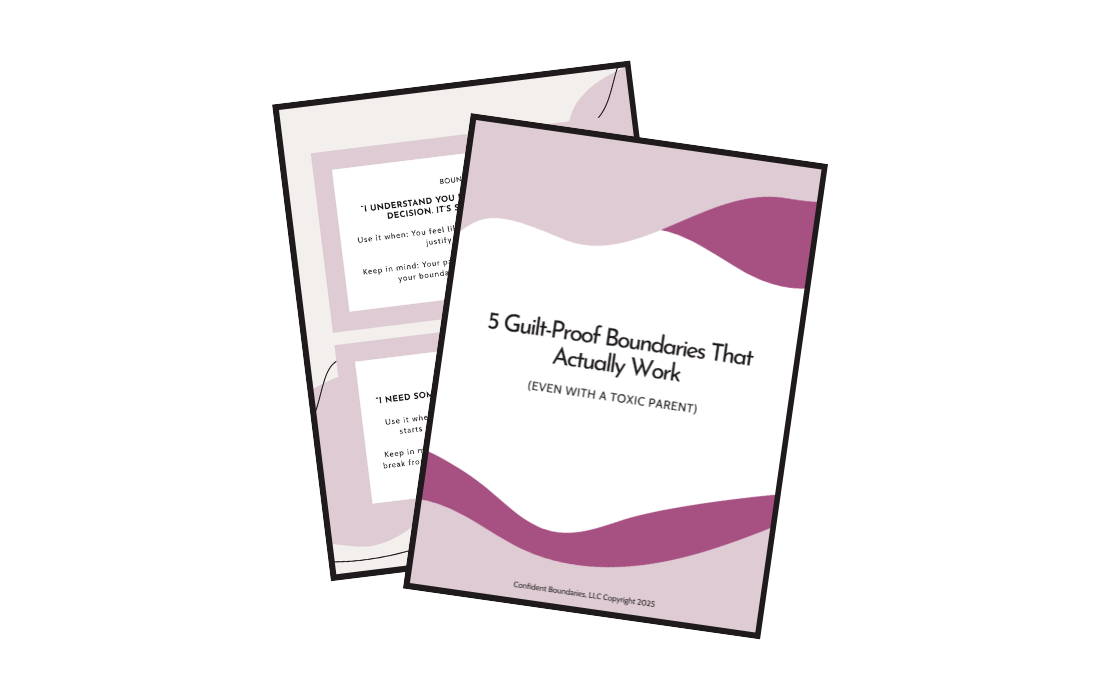
Am I Being Gaslit by My Toxic Parent? 5 Signs You’re Not Overreacting
How to Recognize Emotional Manipulation—Especially When You Grew Up in a Dysfunctional Family
If you grew up with emotionally immature parents or are currently dealing with toxic parents, you’ve probably found yourself second-guessing your own reality more times than you can count. One moment, you feel confident in your memory or emotional response—then suddenly, you’re spiraling with doubt. You wonder: Was I overreacting? Did I make that up? Am I the problem?
If this feels familiar, you might be experiencing gaslighting.
Gaslighting is a form of emotional manipulation that makes you question your perception of events, your feelings, and sometimes even your sanity. And when it comes from someone who was supposed to love and protect you—like a parent—it can be especially confusing and hard to spot.
So how do you know if it’s gaslighting and not just a miscommunication or disagreement?
Let’s break it down.
1. Your memories are constantly challenged or denied.
You remember a conversation vividly—what was said, how it felt—but when you bring it up, your parent swears it never happened. Or worse, they accuse you of twisting their words or making things up. This kind of response can make you feel like you're losing your grip on reality.
Gaslighting thrives in families with emotionally immature parents because these parents often lack the capacity to reflect on their own behavior. Instead of owning up to something hurtful they said or did, they rewrite history to protect their own fragile self-image—at your expense.
2. You feel like you’re always walking on eggshells.
If you find yourself constantly censoring what you say, trying to avoid “setting them off,” or rehearsing conversations in your head to make sure you sound calm and reasonable—those are all red flags.
Gaslighting doesn't always look like yelling or overt aggression. Often, it's more subtle: tone policing, eye-rolling, or making you feel ridiculous for having emotions at all. And if you're dealing with a toxic parent who flips the narrative whenever you try to set boundaries, you might start to believe that you're the one being too sensitive or difficult.
3. You doubt yourself more after talking to them.
One of the hallmark signs of gaslighting is a growing sense of confusion. You might enter a conversation feeling clear and grounded, but leave feeling scattered, guilty, or unsure if your concerns were even valid in the first place.
This is how emotional manipulation works: it chips away at your trust in your own judgment. In dysfunctional families, gaslighting often masquerades as “just trying to help” or “you’re reading too much into it”—when really, it’s about control.
4. They play the victim when you try to hold them accountable.
When you confront a gaslighting parent about their hurtful behavior, do they respond with something like, “I guess I’m just a terrible parent then,” or “After everything I’ve done for you, this is how you treat me?”
This isn’t genuine remorse. It’s a manipulation tactic meant to derail the conversation and make you feel guilty for speaking up. Emotionally immature parents often turn themselves into the victim to avoid taking responsibility—and to keep you stuck in the role of the “problem child.”
5. You’ve stopped trusting yourself.
Perhaps the clearest sign of gaslighting is how much it damages your relationship with yourself. You might find it hard to make decisions without checking in with someone else. You might apologize constantly, even when you haven’t done anything wrong. You might feel anxious all the time, but not be sure why.
If this sounds like you, I want you to know: you’re not crazy. You’re not overreacting. You’re not broken.
You’re responding in completely understandable ways to years (or decades) of emotional manipulation.
So, what can you do if you recognize these signs?
Start by getting curious—not judgmental—about your internal experience. When someone makes you feel confused, guilty, or like your reality isn’t valid, pause and ask yourself: Is this a pattern? Do I feel safe expressing myself around this person?
Next, get support. Whether it’s therapy, coaching, or joining a community of people navigating similar dynamics, you don’t have to figure this out alone. Healing from a dysfunctional family system isn’t something you have to do in isolation.
And if you're looking for a place to start, you can check out the Confident Boundaries Membership—a space I created specifically for adults dealing with toxic parents. You’ll get tools, support, and validation from people who get it.
Final Thoughts
Gaslighting is confusing on purpose. That’s what makes it so harmful—and so hard to name. But once you start seeing it clearly, you can begin to untangle yourself from the guilt, self-doubt, and confusion it creates.
You deserve to trust yourself. You deserve to feel grounded in your truth. And you deserve relationships where your reality is respected.
It’s not too late to unlearn the lies you were taught.
You can break the cycle.
And I’m here to help.
You’re Not Crazy.
But you might have been gaslit by your parents.
Learn how to recognize the signs—and start rebuilding trust in yourself.
I hate SPAM. I will never sell your information, for any reason.



